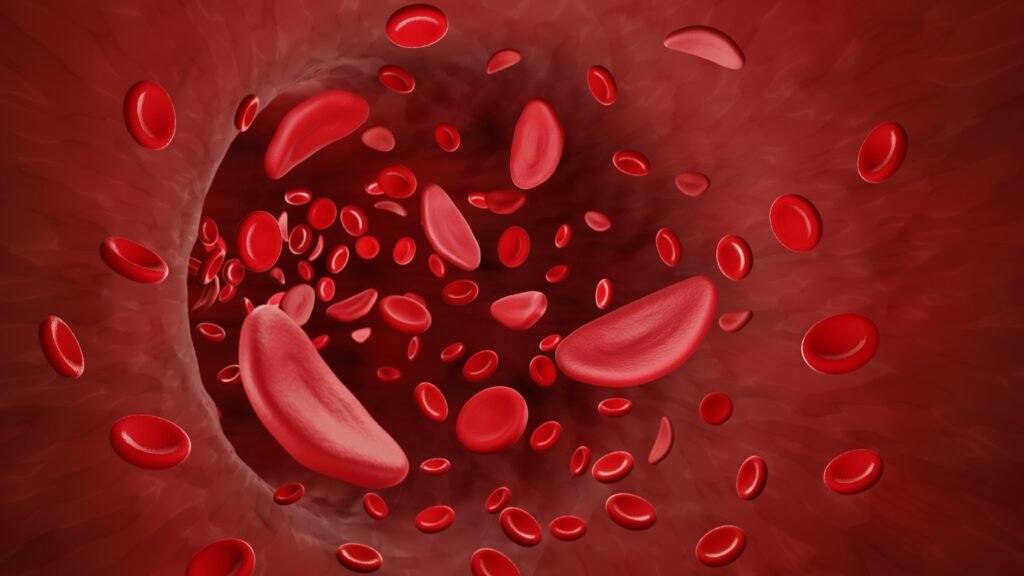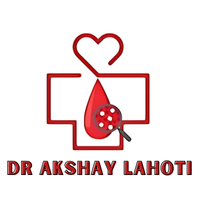Sickle Cell Disease Treatment in Indore by Hematologist Dr. Akshay Lahoti

What is Sickle Cell Disease?
Sickle cell disease is a significant medical condition that damages red blood cells. Normally, red blood cells are spherical and smooth, allowing them to move freely through blood arteries. Sickle cell disease causes these cells to harden and resemble a sickle (a bent farming instrument).
This shape makes it hard for the cells to move through small blood vessels, causing blockages and pain. Dr Akshay Lahoti, a hematologist doctor in Indore at Medicare Hospital, specializes in treating this condition.
What Causes Sickle Cell Disease?
Sickle cell disease is inherited from your parents. If both parents carry the sickle cell gene, their child can get the disease. This gene causes the body to make abnormal hemoglobin, which makes red blood cells sickle-shaped and leads to problems in the body.
Symptoms of Sickle Cell Disease
Painful Episodes
Sudden and severe pains in the chest, joints, or belly.
Anemia
Not having enough healthy red blood cells, causes tiredness and weakness.
Swelling in Hands and Feet
Due to blocked blood flow.
Frequent Infections
Because sickle cells can damage the spleen, making it harder to fight infections.
Slow Growth and Delayed Puberty
Children may grow slower and experience puberty later than others.
Bone Marrow Transplant
Bone Marrow Transplant
Risks include rejection of fresh cells and infections. Finding an appropriate donor match might be difficult.
Medications
Long-term use may have side effects, such as increased infection risk or liver issues.
Blood Transfusions
Regular transfusions can lead to excess iron, which can damage organs if not managed properly.
How is Sickle Cell Disease Treated?
One of the best treatments for sickle cell disease is a Bone Marrow Transplant. This involves transferring healthy bone marrow cells from a donor to the patient to produce healthy red blood cells.
Dr Akshay Lahoti, a hematologist doctor at Palasia, has over 7 years of experience in treating blood diseases and achieving excellent results with bone marrow transplants.

How Many People in India Have Sickle Cell ?
In India, about 150,000 children are born with sickle cell disease each year. It is more common in tribal regions of central India, such as Maharashtra, Madhya Pradesh, Chhattisgarh, Odisha, and Gujarat. Around 20 million people in India carry the sickle cell gene, making it a significant health concern.
Living with Sickle Cell Disease
Regular hematologist visits and adherence to a treatment plan are required for sickle cell disease management. Patients should also focus on healthy eating, staying hydrated, and getting enough rest to manage their symptoms effectively.
Sickle cell disease is a dangerous disorder that, with adequate care and therapy, can be properly managed. Whether it’s sickle cell disease, blood cancer, or lymphoma, having an experienced hematologist is key to getting the best possible care.
Frequently Asked Questions
Sickle cell disease is a condition where red blood cells, which are usually round and smooth, become hard and shaped like a sickle. This makes it difficult for them to pass through blood arteries, resulting in discomfort and other complications. Dr Akshay Lahoti, a hematologist doctor in Indore at Medicare Hospital, specializes in treating this disease.
In India, sickle cell disease affects approximately 150,000 people, primarily in tribal areas. If you need expert care, Dr. Akshay Lahoti, a blood cancer doctor in Indore, provides specialized treatment at Medicare Hospital.
People with sickle cell disease might experience sudden pain in their chest or joints, feel very tired and weak due to anemia, have swelling in their hands and feet, face frequent infections, and show slower growth in children. Dr. Akshay Lahoti, a hematologist doctor at Palasia, is skilled at managing these symptoms.
The main treatment for sickle cell disease is a Bone Marrow Transplant, which can potentially cure the disease by replacing sickle-shaped cells with healthy ones. However, not everyone can receive this treatment, and finding a suitable donor can be challenging. Dr. Akshay Lahoti, one of the best hematologists in Indore, has extensive experience with this procedure.
Many large hospitals in India offer treatment for sickle cell disease, especially those with specialized hematology departments. Advanced treatments like Bone Marrow Transplants are more commonly available in larger, well-equipped hospitals.
Treatment options for sickle cell disease include medications to manage pain and prevent complications, regular blood transfusions, and, in some cases, Bone Marrow Transplants. Dr. Akshay Lahoti, a best hematologist doctor in Indore, provides these treatments at Medicare Hospital.
To manage sickle cell disease, it is important to eat healthy foods, drink plenty of water, avoid extreme temperatures, and have regular check-ups with a doctor. Dr. Akshay Lahoti, a hematologist doctor at Palasia, can offer guidance on living well with the condition.
